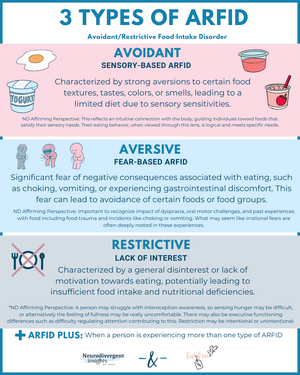ARFID … A food disorder you might not be aware of
What exactly is ARFID?
ARFID is a lesser-known food disorder, but it seems to be on the increase. Its full name is Avoidant/Restrictive Food Intake Disorder, and it is a disorder in which the person will not or cannot eat a particular food (or foods), or foods of a particular kind (creamy, crunchy, spicy, soft, a particular colour, whatever), and will do anything to avoid eating them.
ARFID can affect anyone of any age. It’s not limited to children, or teenage girls, or anyone in particular. Having the disorder might entail weight loss, but that’s not necessarily the case. It might have other negative effects, such as making it difficult to eat in the company of others. But in itself the disorder is not dangerous. Unless, of course, it means that the person cannot eat nutritious foods and might therefore suffer nutritional deficiencies.

There is no single cause for ARFID – it’s a condition that could develop for various reasons. The person with the condition might have had a bad experience with a certain food, and that has left a strong negative impression. For example, the person might have had a frightening choking fit while eating it and finds that he or she can simply no longer eat that food. Maybe they vomitied violently while eating it, or right after eating it, and again it might have left a strong aversion to the food.
On the other hand, they might be particularly sensitive to a certain food, or type of food, and this could be based on its texture, its taste, its appearance, its smell, or whatever. Or there might seem to be no logical reason for the aversion. Perhaps it’s the result of some odd idea or faulty thinking. On the other hand, they might be particularly sensitive to a certain food, or type of food, and this could be based on its texture, its taste, its appearance or whatever, or there might seem to be no logical reason for the aversion.
There could be a physical cause
It’s tempting to look for the cause of ARFID in a person’s thought patterns, but you shouldn’t ignore the possibility that there is a physical cause. The person might actually have difficulty in recognising they’re hungry in the normal way, or they might just have a poor appetite. In this case, eating might start to seem like an unattractive chore that has to be done, but doesn’t entail any joy or interest. A person might have any one of these causes, or more than one. And sometimes, it’s important to note, there might not appear to be any particular reason why someone develops ARFID. Also, the condition might appear in someone alongside another condition, such as anxiety, or autism, or ADHD, or any one of several other conditions.

Sorry ... MEMBERS ONLY!
UNLOCK FOR FULL EXERCESS!EXERCESS is an online community of people who want to seriously improve their health and fitness, both mental and physical.
JOIN FREE TODAY!
… and get complete and unfettered access to an absolute goldmine of valuable information.
Already a member? Sign in!
